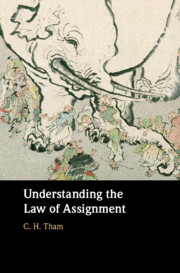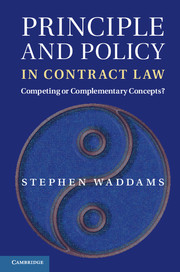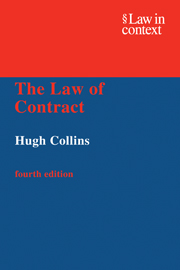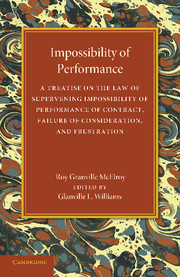
Understanding the Law of Assignment
$51.99 ( ) USD
- Author: C. H. Tham, Singapore Management University
- Date Published: October 2019
- availability: This ISBN is for an eBook version which is distributed on our behalf by a third party.
- format: Adobe eBook Reader
- isbn: 9781108600958
Find out more about Cambridge eBooks
$
51.99 USD
( )
Adobe eBook Reader
Other available formats:
Paperback, Hardback
Looking for an examination copy?
If you are interested in the title for your course we can consider offering an examination copy. To register your interest please contact [email protected] providing details of the course you are teaching.
-
The practical importance of intangible personalty such as debt, bonds, equities, futures, derivatives and other financial instruments has never been greater than it is today. The same may be said of interests in intellectual property. Yet the assignment of these intangible assets from one to another remains difficult to understand. Assignments are often taken to operate as a form of transfer akin to conveyances of legal titles to tangible personalty. However, this conception does not accurately reflect the law of assignment as it has developed in the caselaw in England and Wales. This book sets out a different model of the workings of assignments as a matter of English law, one that provides an analytical, yet historically sensitive, framework which allows us to better understand how, and why, assignments work in the way the cases tell us they do.
Read more- Extensive application of Hohfeldian terminology and analysis shows how different ways of dealing with intangible assets affect the relationships between the parties dealing in those assets, as well as third parties interacting with those assets
- Provides examples to illustrate how the law on equitable and statutory assignment operates and allows for clearer understanding of the detailed steps in the operation of the law
- Offers extensive and detailed examination of the pre- and post-Supreme Court of Judicature Act 1873 position and reveals how this law has developed
Reviews & endorsements
‘Chee Ho Tham has here produced a remarkably well-written, erudite and thoroughly informative work, and in addition a very distinct accretion to the scholarship on assignment. I recommend it without hesitation to commercial and obligations lawyers alike.’ Andrew Tettenborn, Lloyd's Maritime and Commercial Law Quarterly
Customer reviews
Not yet reviewed
Be the first to review
Review was not posted due to profanity
×Product details
- Date Published: October 2019
- format: Adobe eBook Reader
- isbn: 9781108600958
- contains: 3 tables
- availability: This ISBN is for an eBook version which is distributed on our behalf by a third party.
Table of Contents
Part I. Introduction:
1. Introduction
2. A conceptual account of equitable and statutory assignments
Part II. The Model:
3. Invariability
4. Different models of equitable assignment
5. Misconceptions
6. Combination
Part III. Joinder:
7. Joinder of assignor in equitable proceedings
8. Joinder of assignor in proceedings at common law
9. Equitable assignments of legal choses and non-joinder of the assignor
Part IV. Notice:
10. Giving notice of equitable assignments and its effect on competing assignees: the 'rule' in Dearle V. Hall
11. Knowledge of assignment: substantive effects in equity between obligor and assignor
12. Knowledge of assignment: procedural avoidance in equity and by statute of 'equities' or 'defences'
Part V. Statutes:
13. 'Statutory' assignments under Law of Property Act 1925, Section 136(1)
14. Statutory dealings in specific classes of intangible assets
Part VI. Consequences:
15. Why it matters.
Sorry, this resource is locked
Please register or sign in to request access. If you are having problems accessing these resources please email [email protected]
Register Sign in» Proceed
You are now leaving the Cambridge University Press website. Your eBook purchase and download will be completed by our partner www.ebooks.com. Please see the permission section of the www.ebooks.com catalogue page for details of the print & copy limits on our eBooks.
Continue ×Are you sure you want to delete your account?
This cannot be undone.
Thank you for your feedback which will help us improve our service.
If you requested a response, we will make sure to get back to you shortly.
×




